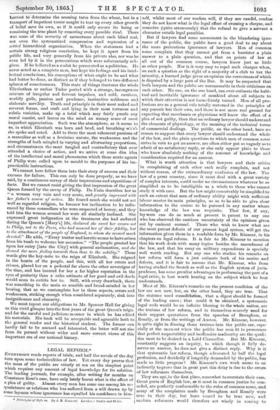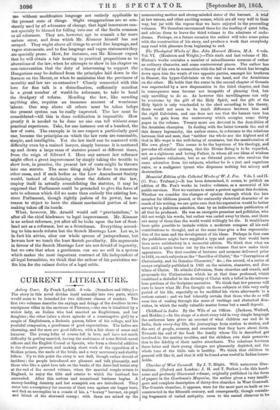LEGAL REFORM.* EVERYBODY reads reports of trials, and half the
novels of the day turn upon some technicalities of law. Yet every day proves that the mass of the public are utterly at sea on the simplest point which requires any amount of legal knowledge for its solution. The leading journals, for example, after writing for months on Constance Kent's case, have only lately learnt what is the effect of a plea of guilty. Almost every man has some one among his ac- quaintance or relations who has suffered from a will drawn up by some layman whose ignorance has equalled his confidence in him-
• Principles of Reis mt. By J. B. Kinnear. LondAn : Smith and Eller.
self, whilst most of our readers will, if they are candid, confess they do not know what is the legal effect of crossing a cheque, and conceive (quite erroneously) that the refusal to give a servant a character entails legal penalties.
But if lawyers find some amusement in the blundering igno- rance of the public, the public have a good deal to say about the more pretentious ignorance of lawyers. Men of common sense complain that they cannot get from a barrister a plain answer to a plain question, and that on points of law at all out of the common course, lawyers know just as little as other people. Nor is it very easy to repel such charges when, on such a question as the right of a majority of a club to tax the minority, a learned judge gives an opinion the correctness of which is disputed by a large part of the Bar. It may be suspected that both lawyers and the public are unreasonable in their criticisms on each other. No one, on the one hand, can over-estimate the habi- tual and inevitable ignorance of mankind about all subjects to which their attention is not immediately turned. Men of all pro- fessions are as a general rule totally unversed in the principles of any pursuit but their own, and there is not more real ground for expecting that merchants or physicians will know the effect of a plea of not guilty, than that an ordinary lawyer should understand the elements of physiology, or the meaning of the technical terms of commercial dealings. The public, on the other hand, have no reason to suppose that every lawyer should understand the whole of the law, and the plain questions to which men of common sense strive in vain to get an answer, are often either put so vaguely as to admit of no satisfactory reply, or else only appear plain to those who know absolutely nothing of the amount of knowledge and consideration required for an answer.
What is worth attention is that lawyers and their critics in complaining of each other each really complain, and not without reason, of the extraordinary confusion of the law. The law of a great country, since it must deal with a great variety of complex interests, could under no circumstances whatever be so simplified as to be intelligible as a whole to those who cannot study it with care. But the law might conceivably be simplified to such an extent that men of ordinary ability might with sufficient labour master its main principles, so as to be able to give clear information to the course to be pursued in any matter where knowledge of the law was requisite. That few, if any, lay wers can do as much at present is patent to any one who has observed the cautious uncertainty of the opinions given out by eminent counsel. Those who wish to know what are the most patent defects of our present legal system, will get the information given them in a readable form by Mr. Kinnear, in his chapters on legal reform. It is fair to Mr. Kinnear to mention that his work deals with many topics besides the amendment of the law, and that his essay on military expenditure is specially well worth reading. But any one who studies his remarks on law reform will form a just estimate both of his merits and defects, and it is fair to assume that Mr. Kinnear, who from having studied the Scotch as well as the English system of juris-
prudence, has some peculiar advantages in performing the part of a legal critic, is best worth hearing on the subject which he best understands.
Most of Mr. Kinne,ar's remarks on the present condition of the law are not new, but, on the other hand, they are true. That the statutes need consolidation, that a digest should be formed of the leading cases ; that could it be obtained, a systematic legal code would be an infinite blessing to the whole nation, are the truisms of law reform, and in themselves scarcely need for their support quotations from the speeches of Brougham, or Romily, or from the writings of Austen. Mr. Kinnear, however, is quite right in dinning these truisms into the public ear, espe- cially at the moment when the public has seen fit to pronounce that perfect respectablity and inoffensive mediocrity are the quali- ties most to be desired in a Loid Chancellor. But Mr. Kinnear, constantly suggests an inquiry, to which though it fully de- serves an answer, he does not give a distinct reply. Why is it that systematic law reform, though advocated by half the legal profession, and decidedly if languidly demanded by the public, has made so little progress? Mr. Kiunear's own work seems to us indirectly to prove that in great part this delay is due to the errors of law reformers themselves.
They are apt,in the first place, somewhat to overstate their case. Great parts of English law, as it must in common justice be con- ceded, are perfectly conformable to the rules of common sense, and many of the complaints made by Brougham and Romily were true in their day, but have ceased to be true now, and modern reformers would therefore act wisely in ceasing to
use without modification language not entirely applicable to the present state of things. Slight exaggerations are so con- stantly used by all advocates of change, that legal innovators can- not specially be blamed for falling into one of the faults common to all reformers. They are, however, apt to commit a far more serious error, and from which Mr. Kinnear himself has not escaped. They ought above all things to avoid fine language, and vague statements, and to fine language and vague statements they are specially prone. How, for instance, can Mr. Kinnear expect that he will obtain a fair hearing to practical propositions as to alterations of the law, when he attempts to show in his chapter on non-intervention that the duty of intervening to support the Hungarians may be deduced from the principles laid down in the Sermon on the Mount, or when he maintains that the provinces of morality and law are co-extensive? Closely connected with this love for fine talk is a disinclination, sufficiently manifest in a great number of would-be reformers, to take in hand the drudgery of reform. Mending the law, like mending anything else, requires an immense amount of wearisome labour. One step above all others must be taken before the present system can be really improved. The law must be consolidated—till this is done codification is impossible. How greatly it is needed to be done no one can tell without some practical experience. Take, for one instance out of a hundred, the law of costs. The example is in one respect a particularly good one, because the principles on which the law rests are reasonable, simple, and intelligible. Yet the law itself can be mastered with difficulty even by a trained lawyer, simply because it is scattered up and down a large mass of statutes passed at different times, from the reign of Edward L Here any earnest law reformer might effect a great improvement by simply taking the trouble to show how, in practice, the present law of costs might be thrown into one statute. The same thing might be done in numerous other cases, and if such bodies as the Law Amendment Society would, instead of declaiming about the defects of the law, employ itself in actually consolidating the statutes, it may be supposed that Parliament could be persuaded to give the force of acts to schemes which did no more than embody the existing law, since Parliament, though rightly jealous of its power, has no reason to object to have the almost mechanical portion of law- making taken off its hands.
What, however, Mr. Arnold would call "provincialism," is after all the chief hindrance to legal improvement. Mr. Kinnear is an ardent reformer, yet after all he looks upon the law of Scot- land not as a reformer, but as a Scotchman. Everything accord- ing to him needs reform but the Scotch Marriage Law. Let us, is in fact his advice, alter our whole system of jurisprudence, but beware how we touch the least Scotch peculiarity. His arguments in favour of the Scotch Marriage Law are not devoid of ingenuity, but we own that when a gentleman can see no evil in a system which makes the most important contract of life independent of all legal formalities, we think that the ardour of his patriotism un- fits him for the calmer duties of a legal critic.































 Previous page
Previous page